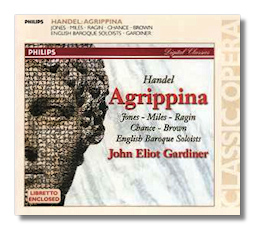
The Internet's Premier Classical Music Source
Related Links
- Handel Reviews
- Latest Reviews
- More Reviews
-
By Composer
-
Collections
DVD & Blu-ray
Books
Concert Reviews
Articles/Interviews
Software
Audio
Search Amazon
Recommended Links
Site News
 CD Review
CD Review
George Frideric Handel

Agrippina, HWV 6
- Donna Brown – Poppea (soprano)
- Michael Chance – Ottone (countertenor)
- Jonathan Peter Kenny – Narciso (countertenor)
- Derek Lee Ragin – Nerone (countertenor)
- Della Jones – Agrippina (mezzo soprano)
- Anne Sofie von Otter – Giunone (mezzo soprano)
- Julian Clarkson – Lesbo (baritone)
- George Mosley – Pallante (baritone)
- Alastair Miles – Claudio (bass)
English Baroque Soloists/John Eliot Gardiner
Philips 4758285 3CDs
Agrippina – a portrayal of lust and power set in first century Rome – was first performed in December 1709 at the Teatro San Giovanni Crisostomo, Venice. This "arrangement" by John Eliot Gardiner was recorded in 1991/2 in London and has now been re-released. It was Handel's second and last opera to be composed during his time in Italy, from 1706 to 1710. Written against some resistance (the composer at first saw "no good reason" to write (such) an opera) in three weeks while in Venice, it represented the first such popular acclaim of Handel's career being performed over two dozen times in succession.
The Venice cast included several singers later to appear in Handel's operas in London, some of whom (Antonio Francesco Carli, the "Claudio", was a bass with a phenomenal range and stunning low register) seem to have had extraordinary capacity and flair. Nor did such singers at the start of the eighteenth century necessarily feel the same distinction as we do today between cantatas, oratorios and operas: all alternated recitativo secco, emotionally charged da capo aria and dramatic intensity. Similarly, it should come as no shock that all but five of the four dozen or so numbers in Agrippina were based on earlier material from Handel's time in Rome in particular. Fashionable at the time, the arias are often accompanied only by continuo until a final orchestral ritornello. This – along with the rich yet restrained characterization – will be one of the first things to strike you on listening to the opera.
Agrippina's libretto is by Cardinal Grimani (1652?-1710) and is generally considered one of the best Handel ever had. Not only because it's so close in accuracy historically to the events on which it's based, but also because of the sensitive insights into human nature that it contains. Intimate irony, serious emotions seriously portrayed and immediately accessible comic situations are its currency (consistent with the prevailing, and by now well-established, Venetian custom), rather than heroic, declamatory high drama.
As befits a piece pointedly caricaturing contemporary Roman intrigue, Agrippina is closer in style to opera buffa, commedia dell'arte even, than a anguished study in untrammeled human frailty. Although – like all good comedy – it is very serious. The balance – and indeed the pace and musicality of much of the recitative – is positively Mozartian in its straightforward, unfolding simplicity. The characters are almost uniformly well drawn and this cast reflects a sense of passion and commitment by not overplaying the farcical side of their interaction, as has happened all too often in some Handel productions… one thinks of the recent English National Operas staging, which descended at times into gratuitous and somewhat juvenile slapstick, completely missing the subtleties and nuances of the plot in the interests of spurious populism.
So Agrippina allows the frailties, foibles, immorality and amorality of the principals to reveal themselves: Gardiner's more restrained approach does nothing but assist and underline. Simply put, Agrippina plots the downfall of Claudius in order for her son, Nero, to become emperor in his place. It would be too easy to ridicule and condemn such intrigue, exploitative manipulation and lust for power. As it is, Handel's dispassionate and non-judgmental observation makes us more likely to care about the characters and their fates. This production works that way. It's not farce. There is humanity. The result: a sense that nothing, particularly evil, is simple. Gardiner's forces have understood this.
To some extent this compassion and balance are achieved by remarkable musical invention by Handel. Poppea's arias, for example, strike just the right balance between frivolity, superficiality, shallowness and detachment. Of particular note is the excellent singing of the three countertenors, Michael Chance, Jonathan Peter Kenny and Derek Lee Ragin: each shines in his own way; collectively their contributions enliven the performance immensely. On the other hand Alastair Miles as Claudio sings with a superb blend of authority and pathos. Donna Brown achieves the effects of nastiness and a certain hubris convincingly, while Della Jones perfects the blend between evil schemer and nonchalant confidence, which must not become overblown to make maximum impact. It's not necessarily easy to sing insincerity sincerely! She does so convincingly. Indeed, Gardiner's forces achieve very well the balance between the idea of belligerent and bitter plotting and the actual minds and behaviors of those who abandon all principle to do so. Although at the time this set was first released Gardiner had neither recorded nor directed a large number of Handel operas, his interpretative depth and intuition shone through. Definitely recommended.
Copyright © 2007, Mark Sealey




















